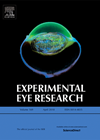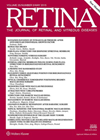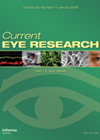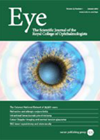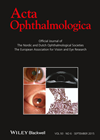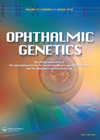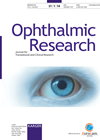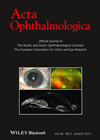You searched for "nAMD"
Belfast briefing: Retina Day roundup from the RCOphth 2024 Annual Congress
2 August 2024
| Rod McNeil
|
EYE - General
Belfast hosted this year’s Royal College of Ophthalmologists’ (RCOphth) Annual Congress, a meeting dedicated to sharing advances, knowledge and clinical practice points in ophthalmic care. This article summarises selected talks by medical and surgical retina specialists during the Retina Subspecialty...
CD40L activation of human RPE cells
1 August 2018
| Graham Wallace
|
EYE - Vitreo-Retinal
Age-related macular degeneration (AMD) is the leading cause of reduced visual acuity in the elderly worldwide. The risk factors involved in AMD include smoking and diet, while genetics have been shown to have a significant role. Recently a link between...
ILM peeling in primary rhegmatogenous retinal detachment
1 June 2015
| Saruban Pasu
|
EYE - Vitreo-Retinal
This author retrospectively analysed the correlation between internal limiting membrane (ILM) peeling and the occurrence of a postoperative epiretinal membrane (ERM) in patients who underwent vitrectomy for rhegmatogenous retinal detachment (RD). There were 135 medical records investigated. Seventy patients underwent...
Control of bleeding with diabetic vitrectomy under air
1 August 2019
| Kurt Spiteri Cornish
|
EYE - Vitreo-Retinal
The authors describe a modified diabetic vitrectomy using continuous air infusion in diabetic eyes with severe fibrovascular proliferation. In their case series of 25 eyes (20 patients), intravitreal bevacizumab (1.25mg) was used one week prior to surgery. Fifteen eyes had...
2024
1 April 2024
| Baljean Dhillon (Prof), David Lockington
Welcome to our Spring Special of 2024! The year is well underway and I can feel change is in the air. It’s the Chinese year of the dragon, generally regarded as a good sign, plus it’s 40 years on from...
Computerised visual acuity measurements in AMD
1 December 2015
| Nana Theodorou
|
EYE - Vitreo-Retinal
The aims of this study were to investigate whether half-letter width spacing in COMPlog algorithms had an adverse effect on agreement in patients with AMD with the ETDRS chart. Fifty adult participants with AMD took part with a median age...
AMD and visceral fat and pro-inflammatory factors
1 December 2015
| Bheemanagouda Patil
|
EYE - Vitreo-Retinal
Several large studies have shown a positive relationship between age-related macular degeneration (ARMD) and high body mass index. The waist-hip ratio is also associated with development of early AMD. Visceral fat has a pro-inflammatory effect, which means it has an...
Complement factor B polymorphism and the phenotype of early age-related macular degeneration
1 August 2014
| Huw Edward Oliphant
|
EYE - Vitreo-Retinal
The relationship between complement factor H (CFH) and age-related macular degeneration (AMD) is very well known, but other genetic polymorphisms relating to AMD are more poorly understood. This study was designed to investigate the relationship between complement factor B (CFB)...
Complement Factor H and Factor H-Like protein are expressed in human RPE cells
1 April 2014
| Bheemanagouda Patil
|
EYE - General
The role of inflammation in age-related macular degeneration (AMD) is well documented and the association of AMD with the inflammatory marker C-reactive protein (CRP) and members of the complement system underline the role of complements in AMD. Human complement factor...
The rarebit vision test for macular conditions
1 October 2015
| Nana Theodorou
|
EYE - Vitreo-Retinal
Rarebit testing is used to measure low degrees of neuro-visual damage and is available for free on the internet. It consists of a fixed bright light dot presented on a black background. During testing it is presented briefly at different...
HtrA1 enhances cell senescence
1 December 2013
| Graham Wallace
|
EYE - Vitreo-Retinal
A genetic basis for age-related macular degeneration (AMD) has been greatly advanced in recent years. The role of identified pathways such as complement factor H in AMD has been widely investigated. However, the effect of other gene variants identified by...
Discussing treatment modalities for bilateral wet AMD
1 December 2014
| Marie Tsaloumas, Bushra Mushtaq
|
EYE - Vitreo-Retinal
A 65-year-old lady with bilateral wet AMD and vision of 6/24 comes with an internet search about current therapies. How do you explain the various treatment modalities available? There are two NICE approved treatments for wet age-related macular degeneration (AMD)....

